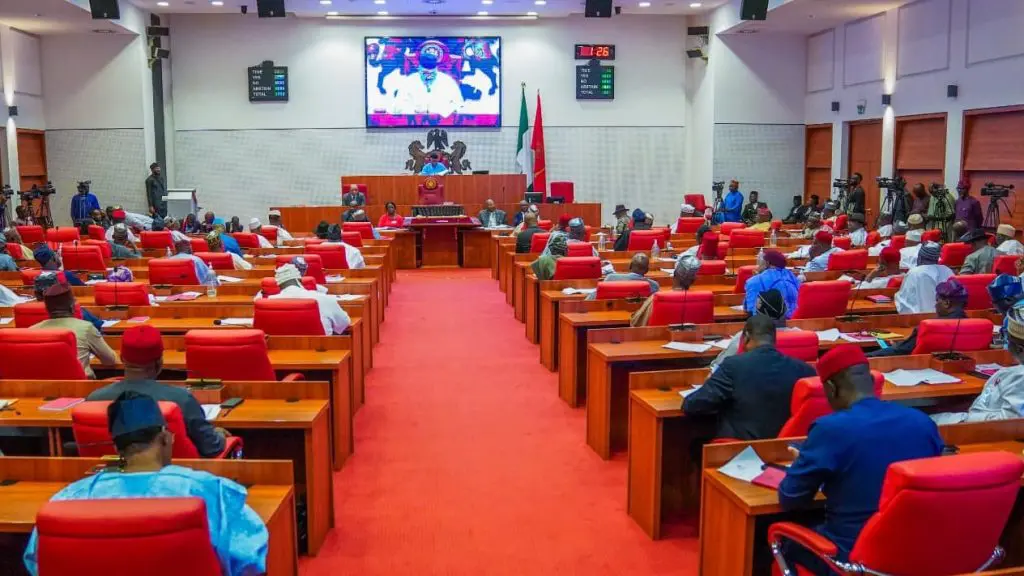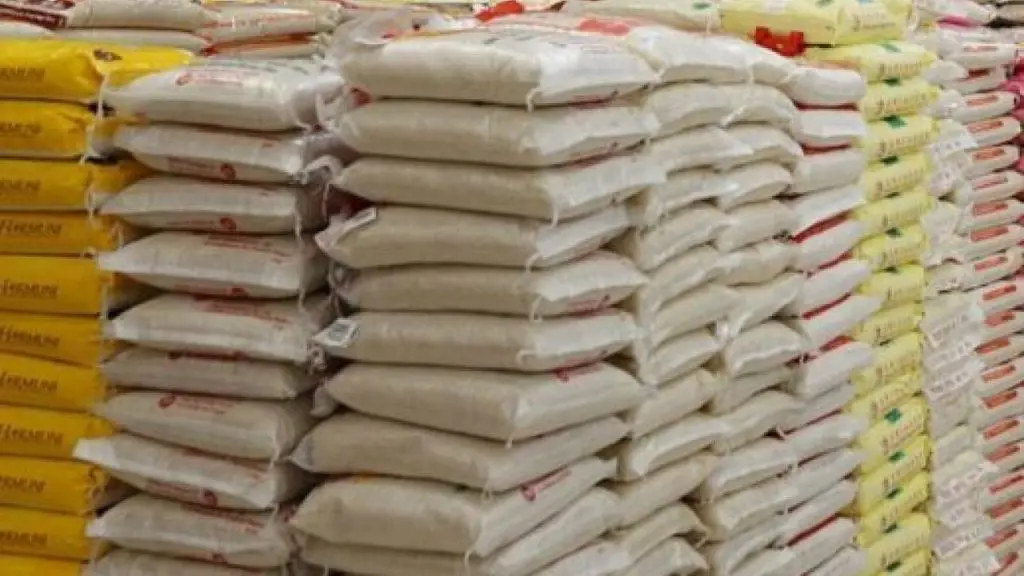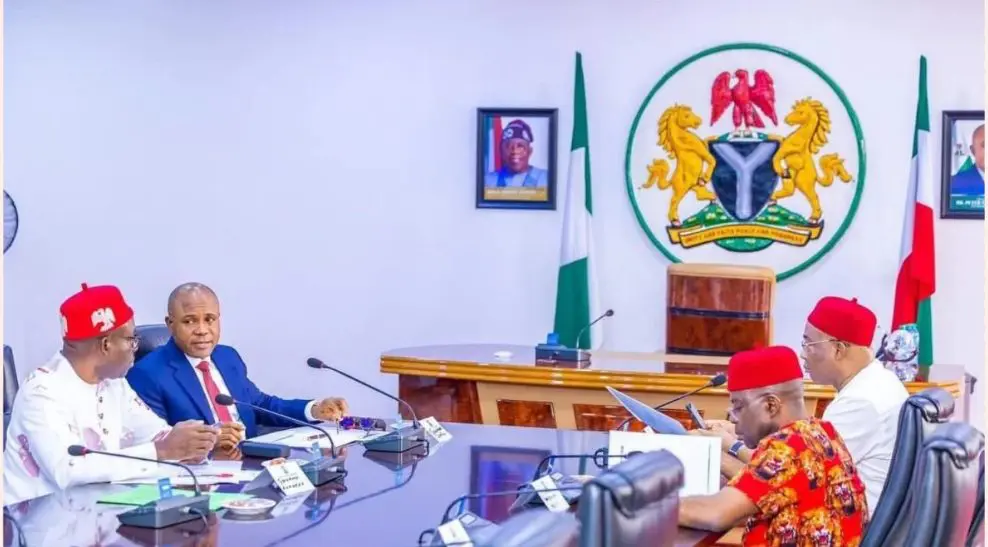News
N3.7trn budget padding controversy: NASS faces fresh integrity crisis

The Senate’s Tuesday session became turbulent as it discussed allegations of budget padding brought up by Senator Abdul Ningi.
Nigeria’s National Assembly, particularly the Senate, has a history of controversies, a trend that has persisted since the nation’s transition to democracy in 1999.
The 10th National Assembly continues this trend, with the latest controversy involving claims of padding the 2024 National Appropriation Act by N3.7 trillion. Despite denials from both the presidency and legislative branch, this issue has shed light on opaque financial allocations to the National Assembly, raising doubts about its integrity.
During the heated debate, Senator Jarigbe disclosed that some senators purportedly received N500 million each from the 2024 budget. This revelation, made on the Senate floor, adds to the ongoing scrutiny of budgetary processes.
Senator Ningi, representing Bauchi Central, initially raised the alarm about the alleged padding, which sparked the controversy. He questioned the fairness of budget allocations across different senatorial districts and challenged the transparency of Senate leadership’s expenditures.
These controversies have fueled calls to reduce the National Assembly’s budget, with critics arguing that lawmakers aren’t delivering commensurate results.
The National Assembly’s past controversies include amendments to the 2022 supplementary budget, which allocated N70 billion for lawmakers’ working conditions, drawing criticism from the public.
Additionally, the purchase of new SUVs for lawmakers further stirred public outrage amid economic hardship.
Senator Akpabio’s inadvertent revelation of funds sent to senators during recess added fuel to the controversy, highlighting issues of fiscal transparency and accountability within the National Assembly.
Former President Buhari’s concerns about budget padding further underscore the recurring nature of such controversies, with recent revelations by Senator Ningi reigniting debates over fiscal integrity and legislative accountability.
The unfolding drama in the Senate has drawn mixed reactions, with some defending the institution’s integrity, while others view the allegations as symptomatic of broader systemic issues. Calls for transparency and accountability within the National Assembly persist amidst ongoing debates and revelations.
News
Why rice price is decreasing in Nigeria – Millers

The Association of Rice Millers has attributed the nationwide decline in rice prices to the reopening of the Nigeria-Niger border. Jonathan Joshua, the chairman of African Rice Millers in Nasarawa, conveyed this information in a statement.
Joshua, who also serves as the national president of the Association of Small-Scale Agro Producers in Nigeria, highlighted that the price of rice is anticipated to decrease even more in the next couple of months with the onset of harvest.
“Some mills that ceased operations due to a shortage of paddy last year and earlier this year are now resuming production as they can easily acquire the grain from neighboring countries following the reopening of the Nigeria-Niger border,” he stated.
“We anticipate further decreases in paddy prices when farmers begin harvesting in two months,” he added.
Despite the inflation rate rising to 33.20 percent in March 2024, rice prices have decreased by 19 percent.
News
Dislodged criminals relocating to rural communities – Abia govt alerts citizens

The Abia State government has reported that suspected criminals, who were previously displaced from their hideouts by the state’s joint security team, Operation Crush, are now relocating to other parts of the state, particularly rural communities, in order to evade detection by law enforcement.
This relocation, as stated by the state government, aims to avoid potential identification by security forces. The concern was raised over the weekend by Navy Commander Mac Donald Uba (Rtd), the Special Adviser on Security Matters to Governor Alex Otti, in a press release.
Uba urged residents of Abia State to remain vigilant regarding the movements of such criminal elements in their vicinity. He also appealed to traditional leaders, Presidents-General, village heads, and village chairmen to promptly report any suspected criminals or individuals with questionable backgrounds to the nearest police station or other security agencies.
News
RUGA: South-East governors living in deceit, denial – Intersociety

The International Society for Civil Liberties and Rule of Law (Intersociety), a non-profit organization dedicated to human rights and democracy advocacy through research and investigation, has accused South-East governors of proceeding with the establishment of Fulani herdsmen settlements across the region.
In a statement provided to DAILY POST on Monday, Intersociety alleged that many of these governors had their elections manipulated and were now executing the agenda of influential figures.
The statement, signed by Emeka Umeagbalasi, Chair of the Board; Chinwe Umeche, Head of Democracy and Good Governance Program; Obianuju Igboeli, Head of Civil Liberties and Rule of Law; Ndidiamaka Bernard, Head of International Justice and Human Rights; Ositadinma Agu, Head of International Contacts and Mobilization; and Chidinma Udegbunam, Head of Campaign and Publicity, warned of dire consequences if South-East lands were handed over to herdsmen.
Intersociety cautioned that the actions of the governors could potentially transform the South-East into a region prone to jihadist violence similar to Benue, Plateau, and Southern Kaduna. Despite previous warnings, evidence suggests a looming threat to the security and safety of the South-East and its inhabitants, particularly regarding freedom of religion, particularly Christianity.
The organization accused the governors of facilitating the influx of Fulani jihadists and their allies into the region, armed with illegal weapons and enjoying impunity. It suggested that the governors’ actions were motivated by their desire to maintain power, even at the cost of compromising the security and religious identity of their constituents.
Intersociety highlighted a statement by the National Leadership of the Miyetti Allah Cattle Breeders Association of Nigeria as evidence of the governors’ complicity in ceding lands to herdsmen. It noted that communal lands, forests, and farmlands in indigenous Igbo areas had been invaded and seized by Fulani herdsmen, armed with illicit firearms.
Furthermore, the organization criticized the biased stance of the Anambra State Government and accused the Enugu State Government of coercing communities to surrender their lands for Fulani settlements.
Intersociety alleged that the Enugu State Government had issued veiled directives to communities, such as Elugwu-Akwu, to hand over their lands for settlement, demonstrating a disregard for the welfare and interests of their citizens.
-

 World News7 months ago
World News7 months agoWhat we know about Israel’s war with Hamas
-

 Sports7 months ago
Sports7 months agoLaLiga: Everyone want to play with him – Vinicius on player Real Madrid should sign
-

 World News7 months ago
World News7 months agoIran calls on Islamic, Arab countries to confront Israel
-

 Tech7 months ago
Tech7 months agoTop 10 AI Skills to Learn in 2023
-

 Entertainment7 months ago
Entertainment7 months agoBET Hip-Hop Awards: Black Sherif wins big as Burna Boy loses seven nominations
-

 Entertainment6 months ago
Entertainment6 months ago‘Black Panther’ star Lupita Nyong’o breaks up with boyfriend, Selema Masekela
-

 ICT8 months ago
ICT8 months agoApple Bows To EU, Unveils iPhone With USB-C Charger
-

 World News7 months ago
World News7 months agoZelensky seeks defences for winter on visit to NATO






